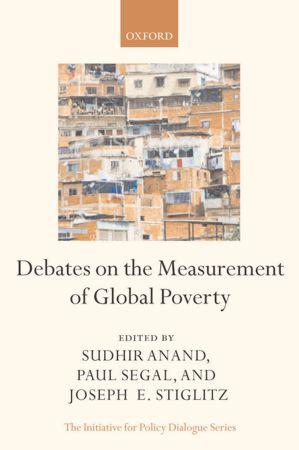Debates on the Measurement of Global Poverty
Joseph E. STIGLITZ, Sudhir ANAND, Paul SEGAL
Availability: Out of stock - available in 10 open days
- Categories: Development, Cooperation and Humanitarian Aid
- Publisher: OUP - Oxford University Press
- Collection: The Initiative for Policy Dialogue
- ISBN: 9780199558049
- Publication Date: 04/03/2010
- Binding: Paperback
- Number of pages: 464
Summary
* Contributions from leading scholars including Nobel Laureate Joseph E. Stiglitz
* Accessible to the educated lay reader, including non-specialists interested in the policy matters under discussion
The international community's commitment to halve global poverty by 2015 has been enshrined in the first Millennium Development Goal. How global poverty is measured is a critical element in assessing progress towards this goal, and different researchers have presented widely-varying estimates. The chapters in this volume address a range of problems in the measurement and estimation of global poverty, from a variety of viewpoints. Topics covered include the controversies surrounding the definition of a global poverty line; the use of purchasing power parity exchange rates to map the poverty line across countries; and the quality, and appropriate use, of data from national accounts and household surveys. Both official and independent estimates of global poverty have proved to be controversial, and this volume presents and analyses the lively debate that has ensued.
Readership:
Academics and students of economics, particularly those interested in development economics and global poverty. Policymakers, policy advocates and NGOs.Table of contents
Sudhir Anand, Paul Segal, and Joseph E. Stiglitz: Debates in the Measurement of Global Poverty: Introduction
Part I
1: Martin Ravallion: The Debate on Globalization, Poverty and Inequality: Why Measurement Matters
2: Sanjay G. Reddy and Thomas W. Pogge: How not to count the poor
3: Surjit Bhalla: Raising the Standard: the War on Global Poverty
4: T. N. Srinivasan: Irrelevance of the $1 a Day Poverty Line
5: Bettina Aten and Alan Heston: Use of Country Purchasing Power Parities for International Comparisons of Poverty Levels: Potential and Limitations
6: Angus Deaton: Measuring poverty in a growing world (or measuring growth in a poor world)
7: Robert Johnston: Poverty or income distribution: Which do we want to measure?
8: Ivo Havinga, Gisele Kamanou and Viet Vu: A note on the (mis)use of national accounts for estimation of household final consumption expenditures for poverty measures
9: Sakiko Fukuda-Parr and David Stewart: Unequal development in the 1990s: Focusing on gaps in human capabilities
10: Albert Berry: Improving Measurement of Latin American Inequality and Poverty with an Eye to Equitable Growth Policy
Part II
11: Carl Riskin and Qin Gao: The Changing Nature of Urban Poverty in China
12: Shaohua Chen and Martin Ravallion: China is poorer than we thought
13: Suresh D .Tendulkar, and K. Sundaram: Poverty Decline in India in the 1990s : A Reality And Not An Artefact
14: David Sahn, Stephen Younger: Living Standards in Africa
